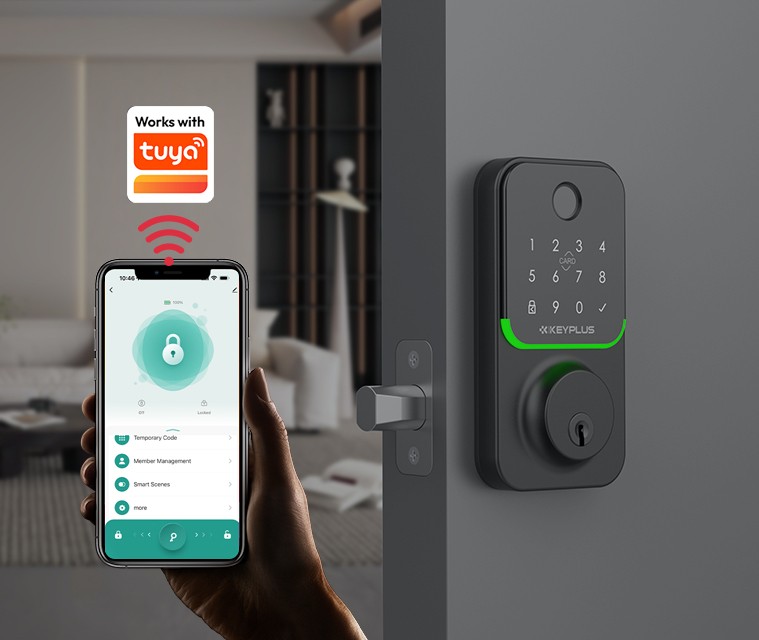What Are the Disadvantages of Keypad Door Locks?
Keypad door locks have gained popularity in the U.S. as a modern alternative to traditional keys. With just a PIN code, you can unlock your door—no fumbling for keys, no worrying about duplicates. But are they really the perfect solution?
While keypad locks offer convenience, they also come with significant drawbacks that many homeowners don’t consider before buying. In this guide, we’ll break down the top disadvantages of keypad door locks, helping you decide if they’re the right choice for your home.
Security Risks: Can Keypad Locks Be Hacked?
Vulnerable to Code Guessing & Shoulder Surfing
One of the biggest risks with keypad locks is unauthorized access. Unlike a physical key, a PIN can be:
- Guessed (if you use a simple code like “1234″ or your birth year).
- Observed (if someone watches you enter the code—called “shoulder surfing”).
- Worn down (over time, certain buttons show more wear, revealing frequently used numbers).
No Tamper Alerts (Unlike Smart Locks)
Most basic keypad locks don’t notify you if someone tries to brute-force the code. Smart locks (like those with Wi-Fi) can send alerts for multiple failed attempts—keypad locks usually can’t.
Power Dependency: What Happens If the Battery Dies?
- Keypad locks run on batteries, and if they die, you could be locked out.
- Some models have emergency power options (like a 9V battery connector), but not all.
- In extreme cold or heat, batteries may drain faster, increasing the risk of failure.
2. Limited User Management (A Problem for Families & Rentals)
Hard to Track Who Enters & Exits
- Unlike smart locks, most keypad locks don’t log which codes were used and when.
- If a guest, contractor, or ex-tenant knows the code, you have no way of knowing if they’ve entered.
No Temporary Access for Guests
- Changing a code requires manually reprogramming the lock.
- If you have Airbnb guests or service workers, you must share your main code or constantly update it.
Code Management Can Be Annoying
- Some locks only allow 4-6 digit codes, making them easier to crack.
- More advanced models let you assign multiple codes, but managing them can be a hassle.
3. Durability & Weather Concerns
Not All Models Are Weatherproof
- If installed outdoors, cheap keypad locks can malfunction in rain, snow, or extreme heat.
- Buttons may become unresponsive or stick over time.
Prone to Wear & Tear
- High-traffic homes may see buttons fade or stop working after heavy use.
- Some electronic components can fail, requiring a full lock replacement.
4. No Remote Access (A Big Drawback for Smart Homes)
Can’t Unlock Remotely
- Unlike Wi-Fi or Bluetooth smart locks, keypad locks require you to be at the door.
- If a family member gets locked out, you can’t let them in from your phone.
No Alerts for Unauthorized Entry
- If someone guesses your code, you won’t get a notification.
- Smart locks can send real-time alerts when the door is unlocked.
5. Installation & Compatibility Issues
Not All Locks Fit Every Door
- Some keypad locks only work with certain door thicknesses or types.
- If you have an older door, you may need additional modifications.
Wiring vs. Battery-Powered Models
- Battery-powered models are easier to install but require frequent battery changes.
- Hardwired models are more reliable but need professional installation.
6. Are Keypad Locks Still Worth It?
Despite these drawbacks, keypad locks aren’t all bad. They’re better than traditional keys in some ways:
No physical keys to lose
Easy for kids or elderly family members to use
More affordable than smart locks
Who Should Avoid Keypad Locks?
- If you want remote access or activity logs, get a smart lock instead.
- If you need high-security protection, a keyless deadbolt + camera may be better.
- If you live in extreme weather, choose a weather-resistant model.
Final Verdict: Should You Get a Keypad Door Lock?
Keypad locks offer keyless convenience, but they come with security gaps, limited user control, and no smart features. For many Americans, a hybrid smart lock (with both a keypad and app control) is a better investment.
Before You Buy, Ask Yourself:
Do I need remote access? → Get a smart lock.
Do I live in a high-crime area? → Consider a smart lock with tamper alerts.
Do I rent out my property? → A temporary access-enabled lock is best.
If you still prefer a keypad lock, choose a high-security model with anti-tamper features and change your code regularly.
Have you used a keypad lock? Share your experience in the comments!
Next Steps:
- Compare top-rated keypad locks on Amazon/Home Depot
- Check for weatherproof ratings if installing outdoors
- Consider a locksmith for professional installation
By weighing the pros and cons, you can make the best choice for your home security needs. Stay safe and keyless!
Post time: Apr-30-2025


